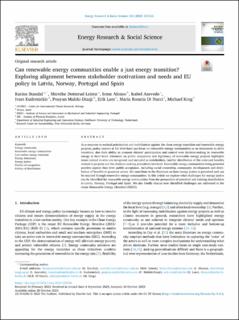| dc.contributor.author | Standal, Karina | |
| dc.contributor.author | Leiren, Merethe Dotterud | |
| dc.contributor.author | Alonso, Irene | |
| dc.contributor.author | Azevedo, Isabel | |
| dc.contributor.author | Kudrenickis, Ivars | |
| dc.contributor.author | Maleki-Dizaji, Pouyan | |
| dc.contributor.author | Laes, Erik | |
| dc.contributor.author | Di Nucci, Maria Rosaria | |
| dc.contributor.author | Krug, Michael | |
| dc.date.accessioned | 2024-03-06T13:12:56Z | |
| dc.date.available | 2024-03-06T13:12:56Z | |
| dc.date.created | 2023-11-14T13:57:59Z | |
| dc.date.issued | 2023 | |
| dc.identifier.citation | Energy Research & Social Science. 2023, 106 . | en_US |
| dc.identifier.issn | 2214-6296 | |
| dc.identifier.uri | https://hdl.handle.net/11250/3121301 | |
| dc.description.abstract | As a response to societal polarisation and mobilisation against the clean energy transition and renewable energy projects, policy makers at EU level have put focus on renewable energy communities as an instrument to drive transition, due their ability to promote citizens' participation and control over decision-making in renewable energy at local level. Literature on public acceptance and legitimacy of renewable energy projects highlights issues related to who are recognised and included as stakeholders, (un)fair distribution of the costs and benefits related to projects and the decision-making procedures involved. Renewable energy communities bring potential positive aspects that drive public acceptance, including social ownership, community development and distribution of benefits to grassroot actors. We contribute to the literature on how energy justice is perceived and can be enacted through renewable energy communities. In this article we explore what challenges for energy justice can be identified for renewable energy communities from the perspective of potential and existing shareholders in Latvia, Norway, Portugal and Spain. We also briefly discuss how identified challenges are addressed in the recast Renewable Energy Directive (REDII). | en_US |
| dc.language.iso | eng | en_US |
| dc.publisher | Elsevier | en_US |
| dc.rights | Navngivelse 4.0 Internasjonal | * |
| dc.rights.uri | http://creativecommons.org/licenses/by/4.0/deed.no | * |
| dc.subject | Energy community | en_US |
| dc.subject | Renewable energy communities | en_US |
| dc.subject | Low-carbon energy transition | en_US |
| dc.subject | Energy democracy | en_US |
| dc.subject | Energy justice | en_US |
| dc.subject | Politics of recognition | en_US |
| dc.subject | Politics of distribution | en_US |
| dc.title | Can renewable energy communities enable a just energy transition? Exploring alignment between stakeholder motivations and needs and EU policy in Latvia, Norway, Portugal and Spain | en_US |
| dc.title.alternative | Can renewable energy communities enable a just energy transition? Exploring alignment between stakeholder motivations and needs and EU policy in Latvia, Norway, Portugal and Spain | en_US |
| dc.type | Peer reviewed | en_US |
| dc.type | Journal article | en_US |
| dc.description.version | publishedVersion | en_US |
| dc.source.pagenumber | 0 | en_US |
| dc.source.volume | 106 | en_US |
| dc.source.journal | Energy Research & Social Science | en_US |
| dc.identifier.doi | 10.1016/j.erss.2023.103326 | |
| dc.identifier.cristin | 2196529 | |
| dc.relation.project | EC/H2020/953040 | en_US |
| cristin.ispublished | true | |
| cristin.fulltext | original | |
| cristin.qualitycode | 1 | |

